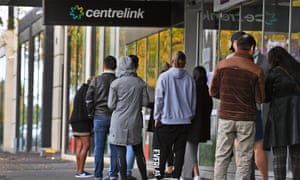Extract from The Guardian
Exclusive: Analysis shows jobseeker and rent assistance will drop below all OECD nations except Greece and New Zealand
A low-paid Australian worker laid off during the pandemic will receive the third lowest unemployment benefit in the OECD when the coronavirus supplement is reduced, according to expert analysis.
Despite mass unemployment and an extended stage-four lockdown in Melbourne, the federal government plans to push ahead with a $300 cut to the supplement on 25 September, reducing the base rate of benefits to about $1,115 a fortnight.
ANU social security expert Prof Peter Whiteford said that by one key measure Australia’s jobseeker payment and commonwealth rent assistance would drop below all OECD nations except Greece and New Zealand.
His analysis uses OECD data examining what is known as the “replacement rate”, which compares unemployment and housing benefits with the income a person received in their last job.
“The replacement rate sounds rather technical, but what it means is how well can you keep your previous commitments if you become unemployed,” Whiteford said.
“[Usually] we do it at a lower level than any other rich country. After the end of September, we will be better than only a couple of places. It’s a dramatic drop.”
Whiteford’s analysis focuses on a single person in their second month of unemployment who had been earning two-thirds of the average wage before losing their job.
With the $550-a-fortnight coronavirus boost, a person in the situation analysed by Whiteford would receive 69% of their past income in unemployment and housing benefits.
This lifted Australia’s unemployment payment closer to the OECD average, leapfrogging countries such as the United States and Canada. Before the pandemic, the rate had been $40 a day, and with housing benefits included the lowest included in the OECD.
When the supplement is tapered this month, the “replacement rate” will drop to about 50%.
The Morrison government has consistently rejected international comparisons by noting other countries require people receiving unemployment benefits to contribute to an insurance scheme while Australia’s system is funded through taxes.
A spokeswoman for the social services minister, Anne Ruston, said the government’s response to the pandemic was well regarded internationally.
She said it was providing “support to millions of Australians through jobkeeper and a temporarily super-charged social security system”.
“Australia’s social security system is non-contributory and is not time-limited, meaning every Australian has equal access for as long as they need, unlike many systems across the OECD which provide higher levels of assistance to those who have earned more during their working life, leaving lower-paid workers worse off,” she said.
“In addition, comparisons with European countries where these sorts of contributory system are common also fail to take into account differences in our taxation systems and non-cash benefits provided by governments.”
The spokeswoman said Ruston had been informed in a phone hookup last month by other nations they also intended to reduce their Covid support.
She pointed to Canada, which will end its emergency response benefit in October and their emergency wage subsidy, and New Zealand, which will stop income relief in November.
The spokeswoman added the UK’s job retention and income supports would also “end in October and all measures in the United States are set to end on 31 December”.
The federal government has extended the coronavirus supplement at the reduced rate until 31 December and boosted the amount benefit recipients can earn before their payments are reduced.
Whiteford acknowledged that international comparisons were complicated given the differences between systems.
Looking at the longer-term unemployed, the rate of Australia’s unemployment benefits was much closer to the OECD average, Whiteford said.
But he insisted that the low rate meant the jobseeker payment was one of the “least effective” as an “economic stabiliser” for the newly unemployed.
He argued this was particularly problematic during the pandemic when large numbers of people had been laid off quickly.
Although many European nations who provide more generous unemployment benefits require income contributions or place a time limit on payments, they still lower means-tested social assistance payments as a safety net.
Whiteford also noted the analysis did not take into account changes to welfare benefits made in some countries during the past year.
“If anything this will make Australia look more favourable,” he said. “For example, in Germany they’ve made that, temporarily, people are getting all of their housing costs covered if they are on an income-tested benefit.”
The global comparison comes as a separate ANU study found the jobseeker and jobkeeper wage subsidy schemes had lifted 2.2 million Australians out of poverty.
But the same paper, by Ben Phillips, Matthew Gray and Nicholas Biddle, found the September changes to the coronavirus supplement will push 740,000 people back into poverty.
About 1.6 million people are currently receiving the jobseeker payment, up from about 700,000 before the pandemic.

No comments:
Post a Comment